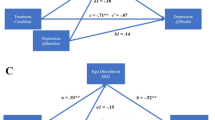Abstract
Sociotropy and autonomy are cognitive-personality styles that have been hypothesized to confer vulnerability to different presentations of major depressive disorder (MDD), which may respond differentially to treatment. Specifically, the profile of low sociotropy and high autonomy is hypothesized to indicate a positive response to antidepressant medication. The current study examines sociotropy and autonomy in relation to sertraline treatment response in individuals with MDD. As part of an ancillary study to the larger Establishing Moderators and Biosignatures of Antidepressant Response for Clinical Care (EMBARC) project, individuals with MDD participated in an 8-week trial of sertraline and completed a self-report questionnaire of sociotropy and autonomy. Discriminant function analyses were used to examine whether sociotropy and autonomy scores could distinguish antidepressant treatment responders (determined by a 50% or greater reduction in depressive symptoms) from non-responders. The sociotropy scale successfully discriminated sertraline treatment responders from non-responders. Further, lower sociotropy was associated with greater improvements in depressive symptomology following sertraline treatment. The current findings suggest individuals with MDD characterized by low sociotropy are more likely to benefit from sertraline. Given the promising results of the Sociotropy-Autonomy Scale in discriminating treatment responders from non-responders, the low resources necessary for administration, and the ease of translation into routine clinical care, the scale warrants further research attention.
Similar content being viewed by others
References
Bagby RM, Gilchrist EJ, Rector NA, Dickens SE, Joffe RT, Levitt A, Levitan RD, Kennedy SH. The stability and validity of the sociotropy and autonomy personality dimensions as measured by the revised personal style inventory. Cognit Ther Res. 2001;25(6):765–79. https://doi.org/10.1023/A:1012975524455.
Beck AT. Cognitive therapy of depression: new perspectives. In: Clayton PJ, Barnett JE, editors. Treatment of depression: old controversies and new approaches. New York: Raven Press; 1983. p. 265–90.
Clark DA, Beck AT. Personality factors in dysphoria: a psychometric refinement of beck’s sociotropy-autonomy scale. J Psychopathol Behav Assess. 1991;13(4):369–88. https://doi.org/10.1007/BF00960448.
Clarke DE, Kuhl EA. DSM-5 cross-cutting symptom measures: a step towards the future of psychiatric care? World Psychiatry. 2014;13:314–6. https://doi.org/10.1002/wps.20154.
Fava M, Davidson KG. Definition and epidemiology of treatment-resistant depression. Psychiatr Clin N Am. 1996;19(2):179–200. https://doi.org/10.1016/S0193-953X(05)70283-5.
First MB, Spitzer R, Gibbon M, William J. Structured clinical interview for DSM-IV-TR axis I disorders−non-patient edition (SCID-I/NP). New York: Biometric Research Department New York State Psychiatric Institute; 2002.
Hamilton M. Development of a rating scale for primary depressive illness. Br J Soc Clin Psychol. 1967;6:278–96. https://doi.org/10.1111/j.2044-8260.1967.tb00530.x.
Hasin DS, Sarvet AL, Meyers JL, Saha TD, Ruan WJ, Stohl M, Grant BF. Epidemiology of adult DSM-5 major depressive disorder and its specifiers in the United States. JAMA Psychiatry. 2018;75:336–46. https://doi.org/10.1001/jamapsychiatry.2017.4602.
IBM Corp. IBM SPSS statistics for windows (No. 26). Armonk: NY IBM Corp; 2019.
Moore RG, Blackburn IM. The stability of sociotropy and autonomy in depressed patients undergoing treatment. Cognit Ther Res. 1994;20:69–80. https://doi.org/10.1007/BF02229244.
Nierenberg AA, Farabaugh AH, Alpert JE, Gordon J, Worthington JJ, Rosenbaum JF, Fava M. Timing of onset of antidepressant response with fluoxetine treatment. Am J Psychiatry. 2000;157:1423–8. https://doi.org/10.1176/appi.ajp.157.9.1423.
Peselow ED, Robins CJ, Sanfilipo MP, Block P, Fieve RR. Sociotropy and autonomy: relationship to antidepressant drug treatment response and endogenous-nonendogenous dichotomy. J Abnorm Psychol. 1992;101:479–86. https://doi.org/10.1037/0021-843X.101.3.479.
Peselow ED, Sanfilipo MP, Difiglia C, Fieve RR. Melancholic/endogenous depression and response to somatic treatment and placebo. Am J Psychiatry. 1992;149:1324–34. https://doi.org/10.1176/ajp.149.10.1324.
Pizzagalli DA, Webb CA, Dillon DG, et al. Pretreatment rostral anterior cingulate cortex theta activity in relation to symptom improvement in depression: a randomized clinical trial. JAMA Psychiatry. 2018;75:547–54. https://doi.org/10.1001/jamapsychiatry.2018.0252.
Robins CJ, Block P, Peselow ED. Relations of sociotropic and autonomous personality characteristics to specific symptoms in depressed patients. J Abnorm Psychol. 1989;98:86–8. https://doi.org/10.1037/0021-843X.98.1.86.
Robins CJ, Luten AG. Sociotropy and autonomy: differential patterns of clinical presentation in unipolar depression. J Abnorm Psychol. 1991;100:74–7. https://doi.org/10.1037/0021-843X.100.1.74.
Rush AJ, Trivedi MH, Ibrahim HM, et al. The 16-item quick inventory of depressive symptomatology (QIDS), clinician rating (QIDS-C), and self-report (QIDS-SR): a psychometric evaluation in patients with chronic major depression. Biol Psychiatry. 2003;54:573–83. https://doi.org/10.1016/s0006-3223(02)01866-8.
Rush AJ, Kraemer H, Sackeim H, et al. Report by the ACNP task force on response and remission in major depressive disorder. Neuropsychopharmacology. 2006;31:1841–53. https://doi.org/10.1038/sj.npp.1301131.
Scott J, Harrington J, House R, Ferrier IN. A preliminary study of the relationship among personality, cognitive vulnerability, symptom profile, and outcome in major depressive disorder. J Nerv Ment Dis. 1996;184:503–5. https://doi.org/10.1097/00005053-199608000-00008.
Thase ME, Ninan PT, Musgnung JJ, Trivedi MH. Remission with venlafaxine extended release or selective serotonin reuptake inhibitors in depressed patients: a randomized, open-label study. Prim Care Companion J Clin Psychiatry. 2011;13.https://doi.org/10.4088/PCC.10m00979blu
Thomas L, Kessler D, Campbell J, Morrison J, Peters TJ, Williams C, Lewis G, Wiles N. Prevalence of treatment-resistant depression in primary care: cross-sectional data. Br J Gen Pract J R Coll Gen Pract. 2013;63:852–8. https://doi.org/10.3399/bjgp13X675430.
Trivedi MH, Rush AJ, Wisniewski SR, et al. Evaluation of outcomes with citalopram for depression using measurement-based care in STAR*D: implications for clinical practice. Am J Psychiatry. 2006;163:28–40. https://doi.org/10.1176/appi.ajp.163.1.28.
Trivedi MH, McGrath PJ, Fava M, et al. Establishing moderators and biosignatures of antidepressant response in clinical care (EMBARC): rationale and design. J Psychiatr Res. 2016;78:11–23.
Funding
The Establishing Moderators and Biosignatures of Antidepressant Response in Clinical Care (EMBARC) study was supported by NIMH grants U01MH092221 (PI: MHT) and U01MH092250 (PIs: McGrath, Parsey, and Weissman). The content is solely the responsibility of the authors and does not necessarily represent the official views of the National Institutes of Health. This work was supported by the EMBARC National Coordinating Center at UT Southwestern Medical Center, Madhukar H. Trivedi, M.D., Coordinating PI, and the Data Center at Columbia and Stony Brook Universities, and a Rackham Graduate Student Research Grant.
Author information
Authors and Affiliations
Corresponding author
Additional information
Publisher’s Note
Springer Nature remains neutral with regard to jurisdictional claims in published maps and institutional affiliations.
Rights and permissions
About this article
Cite this article
Cardinale, R., Menkes, M.W., Andrews, C.M. et al. Preliminary Evidence for Sociotropy and Autonomy in Relation to Antidepressant Treatment Outcome. Psychiatr Q 92, 1069–1077 (2021). https://doi.org/10.1007/s11126-021-09891-1
Accepted:
Published:
Issue Date:
DOI: https://doi.org/10.1007/s11126-021-09891-1




